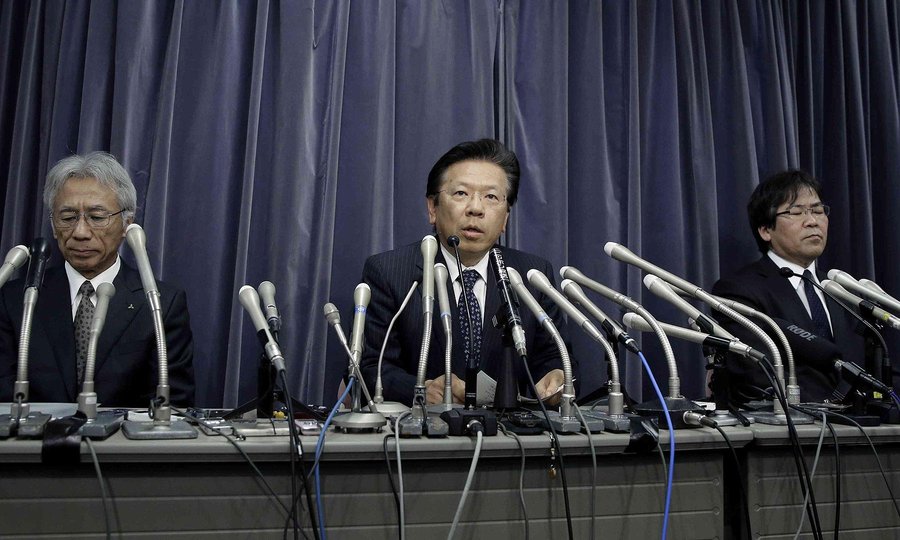Mitsubishi Cheating Deals New Blow To Industry Credibility

Admission this week that it manipulated fuel-economy tests to mislead consumers is an ominous echo of the scandal rocking Volkswagen AG and another example of an automaker trying to skirt an increasing array of government regulations.
The fresh misconduct at Mitsubishi follow scrapes in recent years in which Hyundai Motor Co., its affiliate Kia Motors Corp. and Ford Motor Co. have had to apologize for misstating mileage on window stickers after discrepancies were discovered by regulators and watchdogs.
More manufacturers are at risk of joining the fray, with Daimler AG saying it's cooperating with the U.S. Department of Justice by investigating its emissions and PSA Group being searched by French fraud investigators on Thursday.
Driving the deception is a growing list of regulations aimed at limiting greenhouse gases and boosting fuel economy, such as the U.S. mandate that automakers' models average 54.5 miles (87.7 kilometers) per gallon by 2025.
Car companies are expected to self-regulate by conducting their own tests and submitting them to the government. The increasing number of mileage manipulators is calling that process into question and damaging automakers' credibility with consumers.
"This obviously causes an erosion of trust," said Jake Fisher, who as director of auto testing for Consumer Reports magazine uncovered Ford's failure to meet fuel economy ratings with its hybrid models. "When you spend that much money on a product, you certainly need to be able to trust the automaker is not cheating and not playing the system. That's really a severe problem."
Mitsubishi investigated
Japan's transport ministry continued to inspect Mitsubishi Motors facilities Friday after the automaker's admission that it manipulated tests to exaggerate the fuel economy of 625,000 minicars by as much as 10 percent. The company also said it's been testing passenger cars using a method not compliant with Japanese standards since 2002.
Even before the latest revelations at Mitsubishi, auto executives had sounded warnings about a consumer backlash.
"This one company's deeds has damaged trust in the auto industry," Fumihiko Ike, chairman of Honda Motor Co., told reporters in Tokyo last year after news broke that VW had equipped diesel engines with software that cheated emissions tests.
VW settlement
After months of acrimonious negotiations with U.S. authorities, VW said Thursday that it will fix or buy back about 500,000 tainted cars in the U.S. to atone for its deception. The deal will cost VW at least $10 billion, according to a person with direct knowledge of the matter.
Unlike Volkswagen and Mitsubishi, Daimler and PSA have not admitted to any wrongdoing. The maker of Mercedes-Benz luxury autos is conducting an internal investigation into the certification of its exhaust emissions at the request of the Justice Department and is cooperating with authorities, Daimler said in a statement Thursday.
The search at PSA premises in France was conducted by government fraud investigators as part of a probe into vehicle emissions, the Paris-based company said in a statement on Thursday.
The French Economy Ministry's fraud office said it searched five premises following "anomalies" in the emissions test results of three vehicles, Agence France-Presse reported, citing a statement.
'Telling' mistakes
In late 2014, Hyundai and Kia agreed to pay a $100 million fine to the U.S., give up $200 million in emission credits and spend $50 million setting up independent tests to certify mileage claims.
Ford in 2014 lowered mileage ratings for a second time in a year on its hybrids and compensated more than 200,000 owners of models such as the C-Max and Fusion hybrid. The U.S. automaker blamed a mistake in the software it used to generate mileage estimates for the EPA.
"How come these guys never make a mistake on the low side?" said Karl Brauer, senior analyst for automotive researcher Kelley Blue Book Co. "That's a little telling."
The mistakes and manipulations have taken a toll on carmakers' relations with regulators. The EPA has increased scrutiny of the mileage claims it receives from automakers and is taking longer to verify them, said Alan Baum, an independent auto analyst who advises carmakers on the issue.
The number of cheating scandals "puts the auto companies in a more difficult position because of that lack of trust," Baum said. "This puts the industry on the defensive in times when it wants to be more aggressive."
Tougher testing
With U.S. auto sales projected to hit another record this year, cars are stacking up while awaiting EPA validation of fuel-economy claims, Baum said.
"They've lost the presumption that they're doing it right, and now they're going to have to show that they are," Baum said. "Because the testing system is going to be more difficult, that's going to add costs on both the automaker side and the EPA side."
It also delays how quickly automakers can roll out new models, Brauer said.
"This is going to have a big impact across the industry," Brauer said. "This is slowing down the processing of vehicles right at the stage of introduction. I've heard that for the last few months from every manufacturer."
With Mitsubishi enduring hostile headlines and a government raid on one of its Japanese facilities, that should encourage other automakers to play by the rules, said Fisher of Consumer Reports.
Scandal backlash
"There's a lot of economic incentive for them to game the system, but as these scandals hit, there is backlash," Fisher said. "So I think there's going to be less of this going forward."
Yet, in a brutally competitive industry where billions are spent to gain a 10th of a point of market share, the temptation to cheat may continue to prove irresistible.
"The cynical person would say they'll just come up with new and better ways to cheat," Brauer said. "They'll say, 'Now, we need a new set of tricks that they aren't checking for yet.'"
Nouvelles connexes


